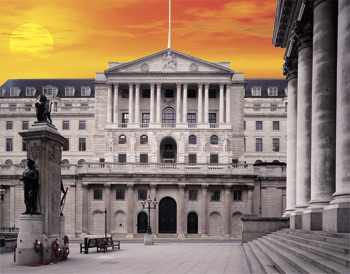
The Banker’s Banker!
Ever thought where high street banks go when they want to borrow money? The answer’s simple: the Bank of England! That’s not the only job it does, mind you, as it also acts as banker for the government, designs our banknotes and makes sure the whole financial system is safe and secure.
But it’s as the bankers’ bank that the Bank of England provides one of its most important services to the nation. That is, keeping prices in the shops steady. Not just the prices of one or two things like games and toys. But the prices of everything a family can buy – from cars and holidays, magazines to CDs, electricity to mobile phone bills. If the prices of all these things start rising, that’s inflation, and we can’t buy as much with our money.
 Inflation needs to be controlled so we have a good idea what our money can buy today, next week, next year and the year after that! The Bank of England keeps inflation steady by controlling the interest rate it charges banks when they borrow its money. Inflation needs to be controlled so we have a good idea what our money can buy today, next week, next year and the year after that! The Bank of England keeps inflation steady by controlling the interest rate it charges banks when they borrow its money.
High inflation happens when we all go out and spend too much. As people demand more and more, businesses struggle to supply all the goods and services their customers want to buy. So they start to raise their prices. If prices keep going up, inflation rises, and our money buys less and less.
What can be done if inflation starts to rise too much? The bankers’ bank has a simple answer, a neat ‘trick’, as it happens. The Bank of England simply raises the amount of interest it charges the banks when it lends them money.
 The banks, in turn, raise the interest they charge us, their customers. This means money costs more if we want to borrow it – so families and businesses tend to borrow and spend a bit less. It also means the banks pay us more interest on our savings – encouraging us to save. The banks, in turn, raise the interest they charge us, their customers. This means money costs more if we want to borrow it – so families and businesses tend to borrow and spend a bit less. It also means the banks pay us more interest on our savings – encouraging us to save.
This whole process brings inflation down again. With less money being spent, it’s easier for businesses to supply what their customers want without raising prices.
Of course, it can just as well happen the other way round! If people aren’t spending so much, businesses may have to cut their prices to increase sales. The result is that prices generally rise more slowly.
But if inflation gets too low, the Bank of England uses its ‘trick’ again. It charges banks less interest to encourage people to spend more. This gets prices rising again, and puts inflation back on track.
It’s a continuous balancing trick which the Bank of England has been performing successfully for years.
www.bankofengland.co.uk/education
 back back
|






 Inflation needs to be controlled so we have a good idea what our money can buy today, next week, next year and the year after that! The Bank of England keeps inflation steady by controlling the interest rate it charges banks when they borrow its money.
Inflation needs to be controlled so we have a good idea what our money can buy today, next week, next year and the year after that! The Bank of England keeps inflation steady by controlling the interest rate it charges banks when they borrow its money. The banks, in turn, raise the interest they charge us, their customers. This means money costs more if we want to borrow it – so families and businesses tend to borrow and spend a bit less. It also means the banks pay us more interest on our savings – encouraging us to save.
The banks, in turn, raise the interest they charge us, their customers. This means money costs more if we want to borrow it – so families and businesses tend to borrow and spend a bit less. It also means the banks pay us more interest on our savings – encouraging us to save.






